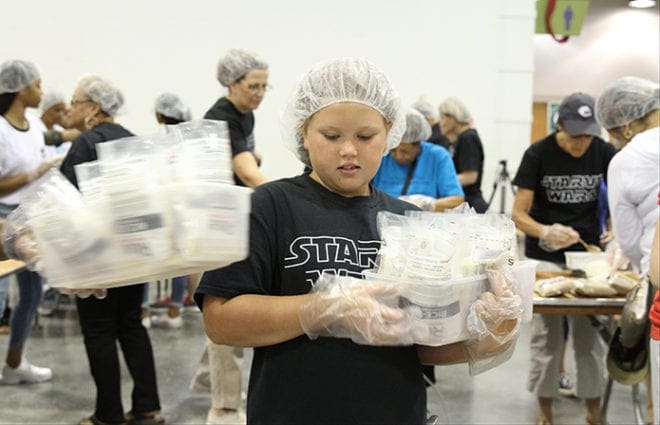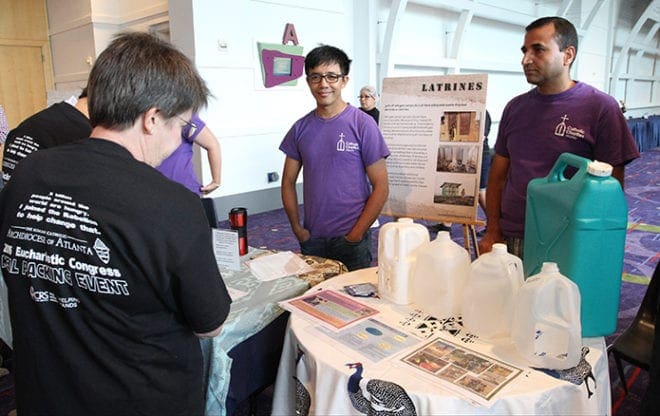(R-l) Pauline Sawadogo and her husband, Jean, of St. John Neumann Church, Lilburn, work on a team that fills meal bags with soy, rice, dehydrated vegetables and a vitamin pack. The couple originally hails from Burkina Faso. In the background on the same side of the table, Natalie Lewis of Holy Spirit Church, Atlanta, and her daughter Dominique, 10, work with another team. Lewis was also accompanied by her sons, 8-month-old Sebastian and 8-year-old Alexander. Photo By Michael Alexander
College Park
Starve Wars packers send meals and a piece of their hearts to West Africa
By ANDREW NELSON, Staff Writer | Published June 23, 2017
COLLEGE PARK—Jean Sawadogo scooped rice into the protein-rich packaged meal as he and his team worked toward the goal of making 100,000 meals.
While people bustling around him were moved by compassion to be at the Starve Wars meal-packing event, Sawadogo and his wife, Pauline, had other reasons to give up their morning on Friday, June 16. They are natives of Burkina Faso, the West African nation where the meals are headed.
“It means a lot. It’s like you are sending a piece of your heart to Burkina Faso,” said the 46-year-old, who teaches English to those who speak other languages.
The husband and wife, along with their 16-year-old son, Vincent, were among more than 500 people who volunteered at the event launching the 2017 Eucharistic Congress of the Atlanta Archdiocese. The family worships at St. John Neumann Church, Lilburn.

Eight-year-old Leslie Beckman worked as a meal bag runner during the first shift of Starve Wars. Beckman joined her grandfather, Deacon Bob Hauert of Immaculate Heart of Mary Church, Atlanta, and other family members for the June 16 service project at the Georgia International Convention Center, College Park. Photo By Michael Alexander
Two sessions were held as individuals and parish, family and business teams worked in assembly-line fashion, measuring and packaging the food and vitamins designed to give nourishment where local food is scarce. In addition, nearly $30,000 was raised to offset some of the costs of the food, shipping and long-term programs to address hunger. Donations are still being accepted to reach $50,000, which is the full cost of the project.
Starve Wars II built on the popularity of last year’s initiative, when the spirituality of the congress was complemented for the first time by the service project to serve the needs of the poor and hungry. It is a joint effort of Catholic Relief Services Helping Hands program, the Justice and Peace Ministries of the Atlanta Archdiocese, and Rise Against Hunger.
Catholic Relief Services programs in Burkina Faso are focused on sustainability. It is a poor country, with limited farmland. About one in three citizens can read. While the meals help immediate needs, the international Catholic nonprofit is investing in sustainable development so people can lift themselves out of poverty. One program provides microloans, giving entrepreneurs training and small financial grants to start family businesses, such as growing produce for market.
Mock refugee camp set up
The hundreds of volunteers at Starve Wars passed a mock refugee camp set up by Catholic Charities Atlanta on their way into the hall at the Georgia International Convention Center.
People learned how refugees in camp subsist on about a gallon of water a day, while Americans use some 167 gallons daily. They spent time in a small blue tarp shelter, which is home to people in a refugee camp for years at a time.

As Starve Wars volunteers observe, Catholic Charities Atlanta staff members Myint Thawng, center, and Pasupati Regmi, right, stand behind one of the tables that depict part of the resettlement process for refugees. Thawng and Regmi, who have personal experience, are natives of the Southeast Asia countries of Burma and Bhutan, respectively. Thawng arrived in the United States in 2006 and Regmi and his family came in 2008. Photo By Michael Alexander
Catholic Charities Atlanta employee Pasupati Regmi experienced life in a refugee camp for 17 years. He and his family fled Bhutan, a Buddhist kingdom, where as followers of the Hindu faith they were targeted for forced conversion by the government. Regmi’s father was imprisoned for 15 months on trumped-up charges, he said.
The family fled and spent months on the road. They found safety in Nepal, living along a riverbank.
“People were living in huts like these, and I joined them,” said the 45-year-old. Regmi was able to get an education in India, but the camp was home. “I had to always survive.”
He arrived in the United States in 2008. He remembers the date, May 12. He became a citizen in 2014.
“I would sleep with my passport for a month. I loved it.”
He returned to the camp a few years ago. His time away had erased the harsh memories, which came flooding back as he stepped into the camp. “I could hardly breathe. I could feel the extent of suffering,” he said.
Today, he is one of the first helping hands to greet wide-eyed newcomers flown from the refugee camps to Atlanta. “I help people who are suffering like me. At the end of the day, when they smile, it is fantastic,” he said.
Frances McBrayer, senior director of Catholic Charities Atlanta refugee resettlement services, hoped the display would encourage people to consider refugees’ situation.
The Trump administration planned to pause refugee resettlement for 120 days and reduce by more than 50 percent the number of refugees admitted each year, as part of an effort to stop new immigration from certain Muslim-majority countries. Court rulings to date have prevented the policy’s implementation.
Refugees are people who are forced to leave their country due to war, persecution or natural disaster.
“Less than 1 percent of refugees worldwide are resettled,” she said. “They didn’t choose to flee. They are made to flee.”
Families, friends pitch in to help
The theme for this year’s gathering of Georgia Catholics was from the Book of Joshua, “As for me and my house, we will serve the Lord.”
Many families and parish groups filled the meal-packaging stations where upbeat music kept the room energized.
Natalie Lewis, with 8-month-old Sebastian strapped to her chest, was doing her part, joined by her son, Alexander, and her daughter, Dominique. They are parishioners of Holy Spirit Church, Atlanta.
Lewis said there was a nice feeling in knowing that people she will never meet will be helped.
“We always pray for certain people. This made it so much more real for them,” she said about the children.
Lewis said her family strives to link what happens at Mass and Catholic social teaching focused on the dignity of others. This project hit the mark, she said.
A group of 27 men and women, who are Hispanic members of St. Oliver Plunkett Church, Snellville, stood at several tables. The group worked both of the shifts set up for meal packing. Many of them planned to go to their jobs afterward as cleaners and store clerks.
Rebecca Juarez, a rising eighth-grader, said being there showed how important it was not to waste food, when so many people go hungry.
“Our religion says to help others like Jesus did. Now we are helping people around the world that need food,” Rebecca said.
Another native of Burkina Faso, Diakaridja Zerbo, was invited by the Sawadogo family to help with the meal packing. A Muslim, Zerbo was fasting for the holy month of Ramadan. He said it was customary in his native country to join friends and family at different faith celebrations.
“This is amazing. This is beyond words,” he said. “You see all the people coming to help a country they don’t even know.”